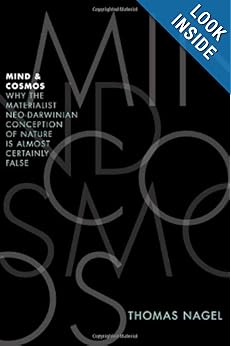 You know you mean to read Mind & Cosmos, the “most despised” anti-materialist, anti-Darwin book ever. But you may get drawn into a discussion of it before you get there.
You know you mean to read Mind & Cosmos, the “most despised” anti-materialist, anti-Darwin book ever. But you may get drawn into a discussion of it before you get there.
Here, Nagel offers the core of the book:
the scientific outlook, if it aspires to a more complete understanding of nature, must expand to include theories capable of explaining the appearance in the universe of mental phenomena and the subjective points of view in which they occur – theories of a different type from any we have seen so far.
There are two ways of resisting this conclusion, each of which has two versions. The first way is to deny that the mental is an irreducible aspect of reality, either (a) by holding that the mental can be identified with some aspect of the physical, such as patterns of behavior or patterns of neural activity, or (b) by denying that the mental is part of reality at all, being some kind of illusion (but then, illusion to whom?). The second way is to deny that the mental requires a scientific explanation through some new conception of the natural order, because either (c) we can regard it as a mere fluke or accident, an unexplained extra property of certain physical organisms – or else (d) we can believe that it has an explanation, but one that belongs not to science but to theology, in other words that mind has been added to the physical world in the course of evolution by divine intervention.More.
 He maintains the reality of the mind, but not of God.
He maintains the reality of the mind, but not of God.
One reason Nagel is so hated is that he made the questions respectable. Time was when people could be put down or blacklisted just for asking or wondering whether materialism is true.